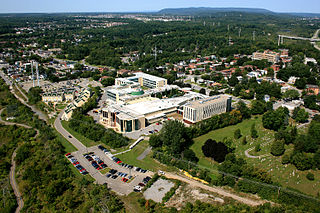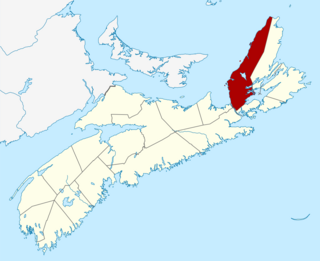
Cape Breton University (CBU) is a public university located in Sydney, Nova Scotia, Canada. It is the only post-secondary degree-granting institution within the Cape Breton Regional Municipality and on Cape Breton Island. The university is enabled by the Cape Breton University Act passed by the Nova Scotia House of Assembly. Prior to this, CBU was enabled by the University College of Cape Breton Act (amended). The University College of Cape Breton's Coat of Arms were registered with the Canadian Heraldic Authority on May 27, 1995.

The Université de Sherbrooke is a French-language public research university in Sherbrooke, Quebec, Canada, with a second campus in Longueuil, a suburb on the South Shore of Montreal. It is one of two universities in the Estrie region of Quebec, and the only French-language university for the region.

The Université de Moncton is a Canadian francophone university in New Brunswick. It includes campuses in Edmundston, Moncton, and Shippagan.

The Université du Québec en Outaouais (UQO) is a constituent university of the Université du Québec system located in Gatineau, Quebec, Canada. As of September 2010, combined enrolment at UQO's Gatineau and Saint-Jérôme campuses was 6,017, of which 4,738 were undergraduates and 1,279 postgraduate students. UQO offers more than 100 programs of study, including 30 master's and 5 doctoral programs.

Atlantic School of Theology (AST) is a Canadian public ecumenical university that provides graduate level theological education and undertakes research to assist students to prepare for Christian ministries and other forms of public leadership. It is located in Halifax, Nova Scotia, Canada, and its enrolment is approximately 160 degree and non-degree students. Persons of all religious traditions, or none, are welcome to study at AST.

Church Point is an unincorporated community located on Saint Mary's Bay in the District of Clare, Digby County, Nova Scotia, Canada.
Saint Mary's University (SMU) is a public university located in Halifax, Nova Scotia, Canada. The school is best known for having nationally leading programs in business and chemistry. The campus is situated in Halifax's South End and covers approximately 32 hectares.

Halifax, Nova Scotia has the largest selection of education options in Atlantic Canada.
Association of Colleges and Universities of the Canadian Francophonie is an association of community colleges and universities in minority francophone communities in Canada, through cooperation between its member institutions. The association represents its member institutions on topics of mutual interest before the Government of Canada, national and international organizations.

Higher education in Canada includes provincial, territorial, Indigenous and military higher education systems. The ideal objective of Canadian higher education is to offer every Canadian the opportunity to acquire the skills and knowledge necessary to realize their utmost potential. It aspires to cultivate a world-class workforce, enhance the employment rate of Canadians, and safeguard Canada's enduring prosperity. Higher education programs are intricately designed with the perspective of the learner in focus, striving to mitigate risks and assure definite outcomes.

Higher education in Prince Edward Island refers to education provided by higher education institutions in the Canadian province of Prince Edward Island. In Canada, education is the responsibility of the provinces and there is no Canadian federal ministry governing education. Prince Edward Island has two post-secondary institutions authorized to grant degrees: one university, the University of Prince Edward Island, and one college, Maritime Christian College. There are also two community colleges: Holland College, which operates centres across the province, and Collège de l'Île, which offers post secondary education in French. The governing body for higher education in Prince Edward Island is the Department of Innovation and Advanced Learning, headed by the Minister of Innovation and Advanced Learning, the Honourable Allen Roach.

Higher education in New Brunswick refers to education provided by higher education institutions in the Canadian province of New Brunswick. Higher education has a rich history in New Brunswick. The first English-language university in Canada was the University of New Brunswick. Mount Allison University was the first in the British Empire to award a baccalaureate to a woman, Grace Annie Lockhart, B.Sc. in 1875. Education is the responsibility of the provinces in Canada and there is no federal ministry governing it.

Higher education in Nova Scotia refers to education provided by higher education institutions. In Canada, education is the responsibility of the provinces and there is no Canadian federal ministry governing education. Nova Scotia has a population of one million people, but is home to ten public universities and the Nova Scotia Community College, which offers programs at 13 locations.

Ambroise-Hilaire Comeau was a merchant and political figure in Nova Scotia, Canada. He represented Digby County in the Nova Scotia House of Assembly from 1890 to 1907 as a Liberal member. He is the first Canadian Senator of Acadian descent from Nova Scotia. His name appears in some sources as Ambrose H. Comeau.

The Faculty of Medicine at Dalhousie University, also known as Dalhousie Medical School, is a medical school and faculty of Dalhousie University in Halifax, Nova Scotia, Canada.

Louis Edouard Deveau is a Canadian businessman and the founder of Acadian Seaplants Limited. He served as the Chancellor of Université Sainte-Anne in Pointe-de-l'Église, Nova Scotia from 2006 to November 2011.
Allister Wilbert Surette is a Canadian politician and former President and Vice-Chancellor of Université Sainte-Anne. He represented the electoral district of Argyle in the Nova Scotia House of Assembly from 1993 to 1998 as a member of the Nova Scotia Liberal Party.
Germaine Comeau is a Canadian writer of Acadian descent.

The Municipality of the County of Inverness is a county municipality on Cape Breton Island, Nova Scotia, Canada. It provides local government to about 17,000 residents of the historical county of the same name, except for the incorporated town of Port Hawkesbury and the Whycocomagh 2 Miꞌkmaq reserve, both of which are enclaves. Public services are provided in the areas of recreation, tourism, administration, finance, and public works.
The Acadian culture has several characteristics that distinguish it from other regions of Canada.



















